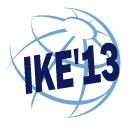The 2013 International Conference on Information and Knowledge Engineering (IKE’13)
May 30, 2013
 IKE is an international conference that serves researchers, scholars, professionals, students, and academicians who are looking to both foster working relationships and gain access to the latest research results. It is being held jointly (same location and dates) with a number of other research conferences; namely, The 2013 World Congress in Computer Science, Computer Engineering, and Applied Computing (WORLDCOMP).
IKE is an international conference that serves researchers, scholars, professionals, students, and academicians who are looking to both foster working relationships and gain access to the latest research results. It is being held jointly (same location and dates) with a number of other research conferences; namely, The 2013 World Congress in Computer Science, Computer Engineering, and Applied Computing (WORLDCOMP).
The Congress is the largest annual gathering of researchers in computer science, computer engineering and applied computing. We anticipate to have 2,100 or more attendees from over 85 countries.
The 2013 Congress will be composed of research presentations, keynote lectures, invited presentations, tutorials, panel discussions, and poster presentations.
To get a feeling about the Congress’s atmosphere, see delegates photos from past events available at: http://worldcomp.phanfare.com/
An important mission of the Congress is “Providing a unique platform for a diverse community of constituents composed of scholars, researchers, developers, educators, and practitioners. The Congress makes concerted effort to reach out to participants affiliated with diverse entities (such as: universities, institutions, corporations, government agencies, and research centers/labs) from all over the world. The Congress also attempts to connect participants from institutions that have teaching as their main mission with those who are affiliated with institutions that have research as their main mission. The Congress uses a quota system to achieve its institution and geography diversity objectives.”
One main goal of the Congress is to assemble a spectrum of affiliated research conferences, workshops, and symposiums into a coordinated research meeting held in a common place at a common time. This model facilitates communication among researchers in different fields of computer science, computer engineering, and applied computing. The Congress also encourages multi-disciplinary and inter-disciplinary research initiatives; ie, facilitating increased opportunities for cross-fertilization across sub-disciplines.